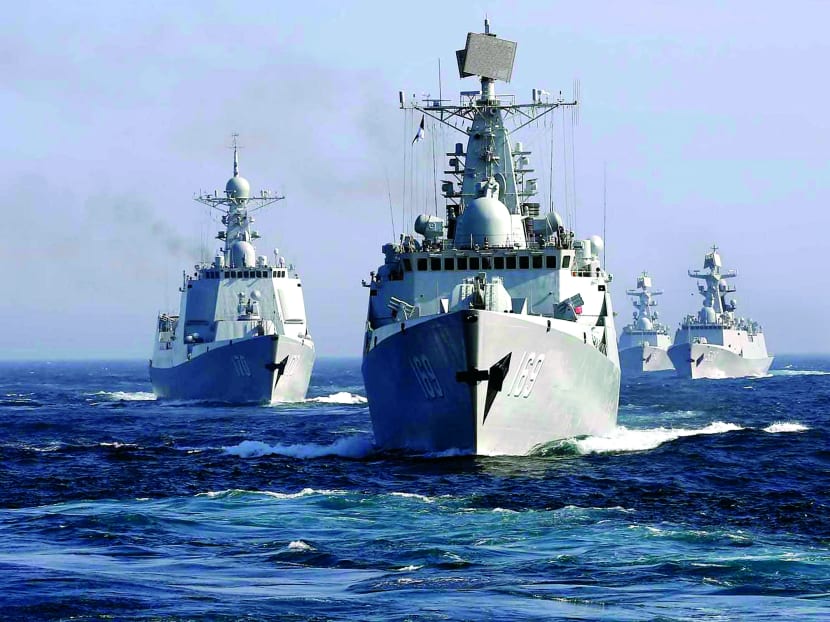Asia-Pacific navies sign sea code to help prevent conflict
QINGDAO — Naval officials from the United States, China and several Asia-Pacific nations adopted an agreement yesterday aimed at heading off accidents and miscommunication at sea to reduce the possibility of conflict amid rising frictions between Beijing and its neighbours.

Chinese ships taking part in a joint exercise with Russia. Beijing has been forceful in its claims over parts of the South China Sea, bringing it into conflict with Vietnam and the Philippines. Photo: AP
QINGDAO — Naval officials from the United States, China and several Asia-Pacific nations adopted an agreement yesterday aimed at heading off accidents and miscommunication at sea to reduce the possibility of conflict amid rising frictions between Beijing and its neighbours.
The Code For Unplanned Encounters at Sea was approved unanimously by more than 20 Pacific countries at the Western Pacific Naval Symposium (WPNS), which began yesterday in the eastern Chinese port city of Qingdao.
Although not legally binding, the agreement indicated China’s willingness to engage with its neighbours, said US officials.
Japan, the Philippines and Malaysia were among the signatories of the agreement, which outlines how warships should communicate and manoeuvre when they come into contact in heavily used sea lanes surrounding China, Japan and South-east Asia.
Tensions have been rising in the region over competing territorial claims, especially over a group of uninhabited islands in the East China Sea that are controlled by Japan, but claimed by China.
Chinese and Japanese ships routinely shadow each other near the islets, a development that analysts have said raises the risk of a conflict.
Addressing the symposium yesterday, China’s navy commander, Admiral Wu Shengli, welcomed the accord as a means for closer cooperation in humanitarian missions as well as a way to avoid misunderstandings.
“For the sake of the extremely precious peace we enjoy at present, we need to ... try to avoid extreme behaviours that may endanger regional security and stability,” Admiral Wu told participants, including US Chief of Naval Operations Jonathan Greenert.
Vice-Admiral Xu Hongmeng of China’s People’s Liberation Army Navy said the agreement would have a positive impact on maritime conduct, but he emphasised that it would have no impact on conduct in the disputed waters of the East and South China Seas.
“You can’t say it’s related to the issues in the South and East China Seas. This is about the navies of many countries,” Vice-Admiral Xu said. “This will not influence those issues.”
Established in 1987, the WPNS comprises navies bordering the Pacific Ocean region and aims to promote cooperation among its members and strengthen mutual trust so as to safeguard maritime security. The biennial meeting yesterday in Qingdao was the first hosted by China, one of its 12 founding members.
The agreement provides simple standardised phrases — such as “alpha”, meaning divers are in surrounding waters — that navies can use when they come across ships from other countries.
While that does not guarantee conflicts will not occur, it does give regional navies a standard way to communicate and avoid incidents such as the Dec 5 near-collision between a US Navy cruiser, the USS Cowpens, and a ship accompanying China’s sole aircraft carrier in international waters of the South China Sea.
The commander of the US Pacific Fleet, Admiral Harry Harris, said Washington would continue to discourage all sides from using force in dealing with territorial disputes.
“The only acceptable way for responsible nations to resolve these issues is through diplomacy. The US strongly opposes coercion or intimidation as means to resolve territorial disputes,” Admiral Harris said.
China has been increasingly forceful in its claims over almost the entire South China Sea, bringing it into conflict with Vietnam and the Philippines, among others.
The US has defence treaties with Japan and the Philippines, raising the prospect of Washington being drawn into a potential conflict if a collision sparks wider tensions. Agencies






